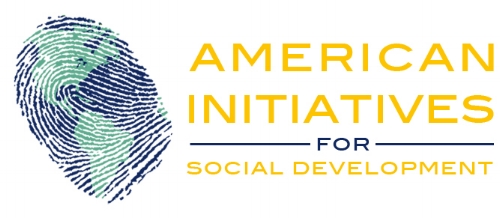The COVID-19 pandemic isn’t over for everyone.
Around the world, food supply chain disruptions have exacerbated hunger and malnutrition. Access to information, sanitizing materials and hotlines for medical care is more limited than ever. American Initiatives partners are solving these pandemic problems, but they need support.
In INDIA,
Covid-19 caused widespread illness, job loss and a severe lack of food that is still having staggering impacts. The Kamalini team has carried out a series of COVID-relief activities to help those most affected, distributing food rations and masks.
During the height of the pandemic, at the request of the local government, Kamalini organised door-to-door home sanitization, temperature screening and educational sessions on safety precautions in villages near the Kamalini campus.
Kamalini also continued its educational initiatives. Classes continued online, and Kamalini rented, renovated and shifted to a larger ground-floor classroom to allow for social distancing. Teachers offered online classes in tailoring, English, digital literacy and financial literacy. Hospitality students in the Kamalini campus hostel continued their training and volunteered in the COVID-relief efforts. Some students even passed to the next level of the NIIT Foundation exam during the crisis.
In the PHILIPPINES,
COVID-19 forced the Foundation for Professional Training to move online for classes. Many of its students are young women from low-income, rural areas. They do not have easy access to the internet, tablets or computer, so the Foundation worked to supply its students with technology.
Donations towards a tablet and internet connection allow students to continue their classes and keep up with their education. Access to technology also helps the Foundation to innovate and afford better educational opportunities.
In NICARAGUA,
ANDECU works in extreme-poverty communities: the rural communities of Carazo, Masaya and Managua. ANDECU has been working around the clock to prevent the spread of COVID-19 in these areas.
ANDECU’s efforts include distributing boxes of food and sanitizing materials to families where the breadwinners have lost their jobs, running awareness and educational campaigns on hygiene and social distancing and manufacturing and distributing face masks.
Currently, ANDECU is reaching 350 families. A donation of just $25 can help feed a family for several days.
In the DEMOCRATIC REPUBLIC OF CONGO,
Nurses on the frontlines of COVID-19 urgently need protective equipment.
Nurses and students from ISSI School of Nursing are on the frontlines of the COVID-19 epidemic at Monkole Hospital in Kinshasa. The risk of contagion is high due to the shortage of protective equipment (PPE). Donations ensure that the hospital has sufficient PPE and disinfectant to help patients and prevent the spread of the disease.
Adriane is a graduate from ISSI who volunteered to work at the COVID-19 floor of the hospital when many other nurses rejected this job out of fear. She says this is what she was trained for at ISSI: to help those most in need. Right now, she says, those in need are the COVID-19 patients who are in great distress and cannot have family members nearby.
Adriane and her colleagues rely on donations to have sufficient face masks, gloves, disposable gowns and disinfectant.
The ISSI School of nursing is also in need of help to continue COVID-19 prevention efforts in rural areas surrounding Kinshasa.
In the wake of COVID-19, people with Sickle cell disease (SCD), an underlying medical condition that may increase risk for COVID-19 infection, are facing serious challenges.
In Sub Saharan Africa, 50–75% of babies are born with SCD. The Democratic Republic of Congo is the third most affected region. Based in Kinshasa, Bomoko United for Congo has been proactive in the fight against SCD through its initiative, CEFA-Monkole. With the rise of COVID-19 cases, it is important to protect the lives of those who are the most vulnerable to the virus.
In VENEZUELA,
KASANAY and PITAHAYA are working hard to prevent the spread of COVID-19 in Mara, a high-risk rural town of the Zulia State. Their efforts include delivering boxes with food, sanitizing materials, face masks and COVID-19 educational materials to people in the area. They also man a hotline that connects those infected with COVID-19 with doctors or nurses. This allows people to receive medical attention and education about isolation to stop the spread of the virus.
In EL SALVADOR,
Manos Amigas has assisted those in extreme poverty for 18 years by providing full-time employment in its artisan workshop, constructing affordable housing and other community development, and providing primary health and nutrition services in its clinic.
During the pandemic, Manos Amigos set a fundraising goal of $53,000. This fundraiser will cover three months of food and health necessities for 346 families who have been economically impacted by COVID-19.
The non-profit Siramá Foundation has helped thousands of women in El Salvador improve their personal and family economy and raise their standards of living for over 50 years. Due to the COVID-19 pandemic, many in the families they serve have lost their jobs or have lost most of the income from their small businesses. In addition, this past summer the country suffered the ravages of Tropical Storm Amanda, which left many families homeless and without food. Many families lost everything they had in this storm.
Siramá Foundation has joined forces with the Forja Foundation and Families helping Families to support El Salvador families in this critical moment. A donation can help them give affected families a home and a meal.
A donation of $20 provides a food basket for one family. $6 covers the cost of roofing materials, and $5 provides plastic to protect homes from the elements. If you want to know more about this initiative, you can visit the Instagram account of Families helping Families. You can also visit the Siramá and Forja Foundation website.
In the midst of the difficulties of Covid-19 and Tropical Storm Amanda , Citalá School has successfully conducted classes through different digital platforms.
During this challenging time, they appreciate the support they have received to continue the school’s mission and commitment to their students.











